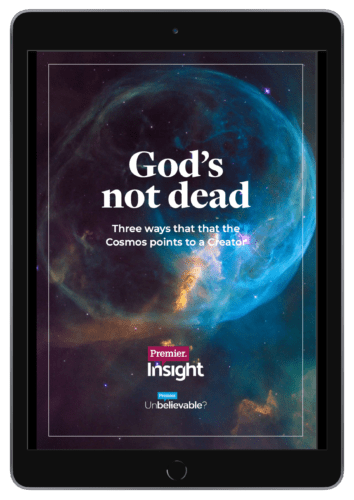
Don’t fall for the blue-eyed Christian Jesus: why understanding Yeshua’s Jewish ethnicity matters
Posted:Erik Strandness reviews The Big Conversation with Amy-Jill Levine and Giles Fraser about the Jewishness of Jesus, and how better understanding and respect can be built up between Jews and Christians.
Christian or Jew? Do we have to choose?
Jesus has one foot in Judaism and one in Christianity yet far too often we treat Him as if He had only one leg to stand on. During His earthly life He never rejected His Jewishness, but He also spoke of building a future church on a rock. How should we understand this shared story and yet be sensitive to the differences between these two great religious traditions?
Journalist-priest Rev Giles Fraser and Jewish scholar Prof Amy-Jill Levine sat down with Justin Brierley on the final installment of The Big Conversation to shed both scholarly and personal light on this important topic. Both guests brought humor, wit, and humility to the conversation making it one of the most enjoyable episodes of the year.
Bus Stop
Levine set the scene for the discussion by describing both the joy and sadness she experienced as a young Jewish girl growing up in a predominantly catholic neighborhood. As a child she took delight in discovering that her catholic friends believed in the same God and shared the same scripture. She came to believe that the catholic church, rather than being a rival, was just the “synagogue we didn’t go to.” Even when confronted with unfamiliar characters from the New Testament she was assured by her parents that they were also Jewish.
Sadly, the innocent celebration of religious similarities was shattered by the cruel accusation of a kid on a school bus who told her – “you killed our Lord.” Levine’s story should encourage us to be like little children and experience the joy of a shared past but also remind us that in interfaith discussions an untamed tongue can be a restless evil, full of deadly poison.
Ghost Story
Levine resonated with Frazer’s description of his Jewish past as a ghost story.
“There’s a past that haunts, sometimes ghosts are friendly and sometimes ghost are things you just have to deal with.” (Levine)
Sadly, the Christian church has historically tried to exorcise these ghosts rather than make peace with them. Levine and Frazer want to correct that misstep and find a way forward that embraces the similarities and respects the differences. Levine summarized the tension.
“I don’t think you need to make Judaism look bad in order to make Jesus look good.” (Levine)
Picked but not Pampered
While the “Chosen People” were picked they were not pampered. Jewish life wasn’t all milk and honey but more often bitter herbs and unleavened bread, it wasn’t home sweet home but life on the road. Judaism was the conduit of salvation for the entire world, and while it occasionally leaked from within and was often cracked from without, it stunningly remained intact. Festival celebrations, food and purity laws, Temple worship and Torah all contributed to the structural integrity of the pipeline of salvation from which Living Water would ultimately flow. We owe them a debt of gratitude for taking on the arduous task of producing a Savior.
There is no Jesus without Judaism. You cannot understand the cross without understanding the cultural soil into which it was plunged. Christians need to remember that Jesus didn’t break with Judaism but served as its completion and any good fruit we can possibly bear will rot if we ignore our Jewish roots.
A Jewish Thought
“Jesus wasn’t a Christian… This is the key mistake; Christians think Jesus was a Christian.” (Fraser)
Many of us remember pictures from our youth of a blond haired, fair skinned, Anglo-American appearing Jesus. The product of a Christian makeover designed to separate Jesus from his Jewish past. Thankfully, the church has allowed His roots to grow back and the color to return to His cheeks. However, despite all this progress, it still refuses to allow Him to have a Jewish thought in His head. Levine described Jesus in this way.
“Jesus is not a rabbi as we think about rabbis from rabbinic literature… He is a lay teacher; he tends not to cite scripture very much and I think when scripture does get cited, I think that’s the gospel writer coming in and filling in the gaps. I think he has an enormous amount of lay wisdom. I think he’s influenced strongly by the prophetic tradition…I think personally he had an experience of God…and it was probably at his baptism that something struck him that he was commissioned to prepare his people for the inbreaking of the Kingdom of God.” (Levine)
We do a disservice to Christ when we retrofit Him with post first century church doctrine. Jesus didn’t travel to Genova and train under Calvin but sat with elders in the Temple. He didn’t nail theses to a German church door with Luther but was nailed to a Roman cross. He didn’t roam the wilderness with the Wesley’s on horseback but entered Jerusalem on a donkey. So, if we want to take every thought captive to Christ then we had best allow Him to think like a Jew.
Rebel or Restorer
The guests pointed out that we tend to place Jesus and the Pharisees in opposition to one another when they were of like mind. Jesus didn’t try to free people from the law but rather encouraged them to adopt even more rigorous “states of ritual purity.” Jesus was a pharisaical champion calling people to not only respect the jot and tittle of the law but also to embrace its Spirit. Jesus made it clear that if the thought wasn’t pure then the words and deeds were empty gestures. Paying lip service to God was meaningless if their hearts were far away from Him. It wasn’t the law that irked Jesus but those who practiced it hypocritically.
What is this New Teaching?
Jesus’ disciples were often puzzled by the things He did and said, they sensed something old yet sprinkled with a twist of the new. He took memories of their Jewish past and stirred them into a pot of already and not yet and asked them to taste and see if it was good. Did Jesus teach something new or just illuminate the old? It was here that the views of Levine and Frazer were most at odds.
Frazer said, “there isn’t much new in the New Testament,” Levine, however, pushed back and opined that Jesus was the only one she could find who encouraged His followers to love their enemies and who offered a new covenant in His blood. She pointed out that the two testaments are different because the old is a promise model and the new is a fulfillment model.
Levine felt it was important to maintain a separation between the Old and New Testaments because she feared that if they were combined then Jewish distinctiveness would be lost, and Judaism would become nothing more than a prelude to Christianity. Frazer, on the other hand, felt that if we failed to unify the two, we would forget our Jewish roots and Christianity would be viewed as a superior “upgrade.”
The difference between Levine and Frazer hinges on the identity of Jesus. If Jesus is the Messiah, then blending the two testaments appropriately completes God’s plan of salvation begun with Abraham, but if He is not, then it is acceptable to view the New Testament as just one more volume of interesting Jewish midrash.
Evangelizing
World religions can live in harmony if they are stuck in expectation, but tensions arise when one of them claims fulfillment. Fulfillment means finality, exclusivity, and consequence which makes them inherently evangelistic. Levine recognizes this tension but believes that Christians should continue to evangelize because that is what they have been commissioned to do.
“I don’t think you (should) sacrifice the particulars of your own religion on the altar of interfaith sensitivity.”
The question for her is not whether Christians should evangelize but rather how it should be conducted. I think part of the problem is that in our zeal to evangelize we dismiss expecting religions as bad news instead of focusing on the Good News of Jesus as fulfillment. Christian evangelization should not be about proving we are right but demonstrating we are blessed, not proving that we know the direction but demonstrating that once lost we have been found.
Restoring Temple Practice
One of the most fascinating parts of the show was when the conversation turned to the significance of the destruction of the Temple in 70 A.D. Levine summarized the issue,
“Judaism following the destruction of the Temple in 70 AD reboots and says OK we lost a temple to the Babylonians back in the 6th century we’ve now lost a new temple. We’ve been there, done that…How do we relocate that divine presence in the absence of the temple? The church went with the sacrifice of the Mass…Judaism shifted from a place to text so the word taking on flesh is the Torah scroll.”
After the destruction of the Temple the Jews marginalized the role of the priests and replaced them with rabbis. Interestingly, the Christian church didn’t abandon ritual sacrifice but made it the center of its worship. While the Jews turned to study of Torah, Christians continued to celebrate sacrifice in the Eucharist. It raises an interesting question, “Did Christianity become more Jewish than Judaism?” Frazer opines,
“You could say that Christianity maintains more of the sacrificial imagery than Judaism.”
I think this idea lends support to the continuity of the Old and New Testaments because Jesus didn’t do something radically new but rather completed what had begun in the OT sacrificial system. One could argue that Judaism became a celebration of the artifacts of divine history while Christianity became the ongoing sacrificial meeting place of God and man.
Bus Stop
We are all children of God riding the salvation school bus. Our task as Christians is to encourage our fellow Jewish passengers to not get off too early because the next Jesus stop may just bring them one step closer to Home.
The show ended on an uplifting note as Levine made an eloquent appeal for mutual respect between Christian and Jewish traditions and encouraged pulpit talk that accurately represented both camps. I would encourage everyone to listen to this amazing discussion because you will not only be entertained but also edified. I hope that Levine and Frazer will once again be paired on a future show so that they can further explore the fascinating interface between Judaism and Christianity.
Erik Strandness is a physician and Christian apologist who has practiced neonatal medicine for more than 20 years.
